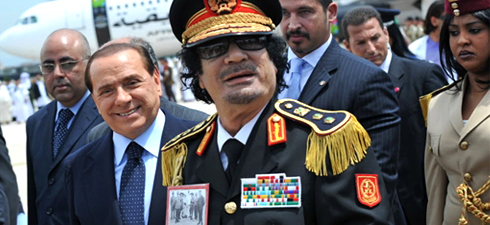On 9 June the representatives of the United Nations High Commissioner for Refugees (UNHCR) were expelled from Libya for engaging in “illegal activities”. At the same time, however, a new round of negotiations got under way with a view to establishing a partnership between Libya and the European Union. It is hard to believe that was a coincidence: for several years, Europe has been counting on Tripoli’s help in checking migratory flows to countries along the Mediterranean. And Gaddafi has already shown he will not hesitate to raise the stakes.
Libya, a hub of migration across the Mediterranean
Libya is nowadays the main point of transit for tens of thousands of Africans who dream of making it to Europe. According to estimates by local authorities, there are currently between one and two million foreigners sojourning on Libyan soil. A great many of them have come in the hope of crossing the Mediterranean to Italy. In 2008, most of the 37,000 immigrants who reached the southern tip of the peninsula in makeshift boats had set off from Libyan shores.
To put an end to this phenomenon, which his allies from the Northern League call an invasion, Silvio Berlusconi concluded a “treaty of friendship” with Muammar Gaddafi, part of which is aimed at combating migration. When the treaty took effect in the spring of 2009, some 850 immigrants were turned away and sent back to Libya, in violation of international law: the Geneva Convention prohibits returning potential refugees to a country where their lives might be at risk.
According to eye-witness accounts gathered by Human Rights Watch, migrants sent back to Libya are generally thrown in prison – if not repatriated to their country of origin, where a fate even less desirable awaits those who tried to escape from persecution. Ignoring accusations levelled by international associations and organisations, the Italian government points to the effectiveness of this collaboration with the Libyan authorities: by the end of 2009, the number of illegal arrivals in Sicily and Lampedusa had plunged by nearly 90%.
EU-Libyan treaty in limbo over refugee issue
Far from condemning this practice, the other EU member countries – first and foremost, France – took advantage of the Italian initiative to seek the rapid conclusion of a partnership deal with Libya to handle the migration issue.
The seventh round of talks, which began on 8 June, between the European Commission and Libyan diplomats, partly revolves around this burning question.
Last summer, the EU was planning to set up “reception centres” in Libya where refugees could apply for asylum without having to risk the perilous crossing. At the time, EU asylum and immigration commissioner Jacques Barrot actually flew down to assess the prospects for such an arrangement first hand.
But the High Commissioner for Refugees, who was also on the spot, expressed serious reservations in view of the “appalling conditions for reception” in Libya. And with good reason: the country has not signed the Geneva Convention governing international refugee law. For Cecila Malmström, who succeeded Barrot this February, no agreement on migration can be concluded until it signs the convention.
Against this backdrop, the decision to close the UNHCR office and expel its 26 employees seems a hard blow for the Europeans – but also for the 9,000-odd refugees who were in its charge. According to one Western diplomat, Libya made that move to check the influx of refugees into the country.
But Gaddafi knows perfectly well that Europe needs an agreement whose migration provisions are formally in line with refugee law in order to be acceptable. So closing the UNHCR office looks like a bluff designed to put pressure on the European negotiators.
Gaddafi demands €5bn p.a.
Ever since he caught on to the Europeans’ heightened sensitivity to the illegal immigration issue, Gaddafi has relished toying with their nerves. Countries like Italy that are directly exposed are now bending over backwards to appease the dictator for fear that he will reopen the “floodgates” of migration.
The latest case in point was the spat between Switzerland and Libya over the arbitrary imprisonment of a Swiss national – who was finally released on 10 June after four months’ detention. This rather preposterous dispute was triggered by the arrest of the dictator’s son by the Swiss police, and came to a head this February when Libya moved to stop issuing visas to European visitors. Italy sided with Gaddafi, accusing Bern of “taking the Schengen Area countries hostage”.
Tripoli’s object is plain: if Europe wants to get Libya to cooperate, it will have to pay the price. Libya is demanding that the EU finance the securing of its own borders with Niger and Chad. The Commission is willing to put €20 million on the table: Gaddafi wants €5 billion.
Until fairly recently, Muammar Gaddafi still ranked high on Western countries’ blacklists of wanted terrorists. Now he is in the Europeans’ good graces – and is turning into an increasingly adept blackmailer. Though he may have become a putatively “respectable” partner, the man remains a fearsome figure.
Was this article useful? If so we are delighted!
It is freely available because we believe that the right to free and independent information is essential for democracy. But this right is not guaranteed forever, and independence comes at a cost. We need your support in order to continue publishing independent, multilingual news for all Europeans.
Discover our subscription offers and their exclusive benefits and become a member of our community now!












